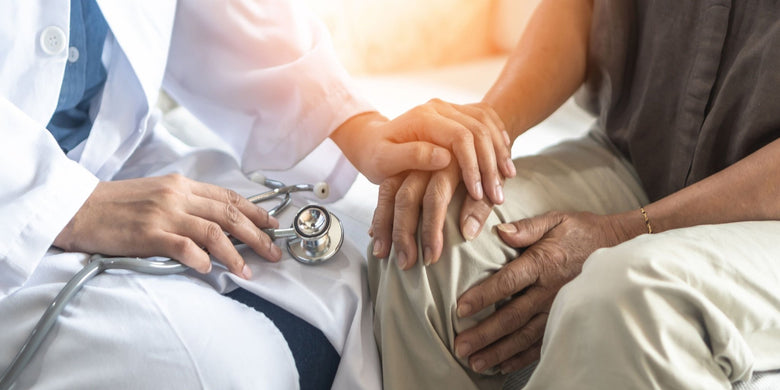
Living with Parkinson's Disease
Date Published: 18th October, 2022
Parkinson’s disease can be a life-changing diagnosis. However, it does not have to completely alter your life. By taking the correct steps, you can live with the condition without having to make too many changes. There are 40+ symptoms of Parkinson’s. Some are mild, whilst others are severe. All symptoms can affect your mental and physical health, and everyone is affected differently. There is a lot of support available, regardless of whether you suffer severely or mildly from the condition.
Tips for Wellbeing
Below is a list of tips that we have taken from the NHS website, that will help you live with Parkinson’s disease. These aim to improve the quality of your life and improve your physical and mental health. If you feel as though you will need mobility or living aids to help you with your daily life, then do not hesitate to get in touch with us. We can offer you free impartial advice. We hope that these tips help you!
Diet and Exercise
Having a good, balanced diet and participating in regular exercise is the key to a happy and healthy life for everyone. You can particularly benefit from a healthy lifestyle if you have Parkinson’s disease.
Exercise can help you ease tension and pain in your muscles. Even stretching or going for a walk daily can help loosen up your joints. If you are committed to exercising, then sports such as yoga or swimming can make a huge difference in your life. Consistency is key! It is important to remember to not strain yourself and to do everything at your own pace.
Regular movement and exercise also have an array of mental benefits. You will notice an improvement in your mood and lower stress levels. This can help you to stay positive and feel like the best version of yourself despite other health issues.
A balanced diet is essential to feeling great physically and mentally. It is vital to maximise your nutrition intake, but also to allow yourself treats and not to overly restrict yourself. Ensure that you get all of the nutrition groups into your daily diet.
Vaccinations
NHS England also suggests that if you have Parkinson’s disease you should keep up with vaccinations. If you have Parkinson’s, you will be asked to get an annual flu jab, to keep you safe throughout the winter months. You will also be encouraged to get the pneumococcal vaccination, which is a one-off and will protect you from severe chest infections. Vaccinations can be the difference between being mildly ill and seriously ill if you are hit with illness.
Check out Millercare’s excellent range of mobility and living aids to improve your daily life!
Support Network
Living with Parkinson’s can be difficult for both the person who has been diagnosed as well as their family and friends, so having an established support network around you can make life easier for everyone.
Talking about Parkinson’s and daily life can be difficult, so it is important to have someone you feel comfortable confiding in, such as a family member, friend or care worker. It is important to be as open as you can. This helps your loved ones understand what you are going through, and they will know how they can support you.
Parkinson’s can be a complicated condition to understand. NHS GPs and specialists will be able to talk you through what to expect and help you out if you have any questions. Health care workers will be an essential part of your support network. Keep in mind that they are always there for you.
If you are struggling with the mental effects of Parkinson’s, such as depression, anxiety, stress or frustration then you may want to consider talking to a mental health professional, such as a counsellor, psychologist or a specialist worker.
Parkinson’s can affect your daily life, such as your movement and ability to complete tasks. However, there are many mobility aids and home adaptations to consider. At Millercare, we have a fantastic and extensive range of aids that will make your life easier and more comfortable, check out the selection of living aids that we offer and our blog post about the best home adaptations.
To further grow your support network, you can consider getting help from a charity. Specialist charities can provide you with advice, suggest support groups where you can talk to people in the same situation or offer financial help for living aids. Parkinson's UK is the main Parkinson’s disease charity in the UK, check out their website for more information about the help they can offer.
Finances
Parkinson’s disease does not always affect your life to the point you have to stop working. Many workers continue with their professions years after finding out they have the disease. However, in more severe cases, some people who have the condition stop working. Nonetheless, there is a lot of financial support out there for people who stop working, such as:
- Personal Independence Payment (PIP). Find out more about this benefit in our complete guide to PIP.
- Statutory Sick Pay (SSP)
- Disability Living Allowance (DLA)
- Attendance Allowance
- Driving
Depending on how severe your case of Parkinson’s is will determine whether you can carry on driving. Once you have received your diagnosis, you must immediately inform the DVLA and your insurance company. This is a legal requirement. The DVLA will use medical information to decide whether you can carry on driving.